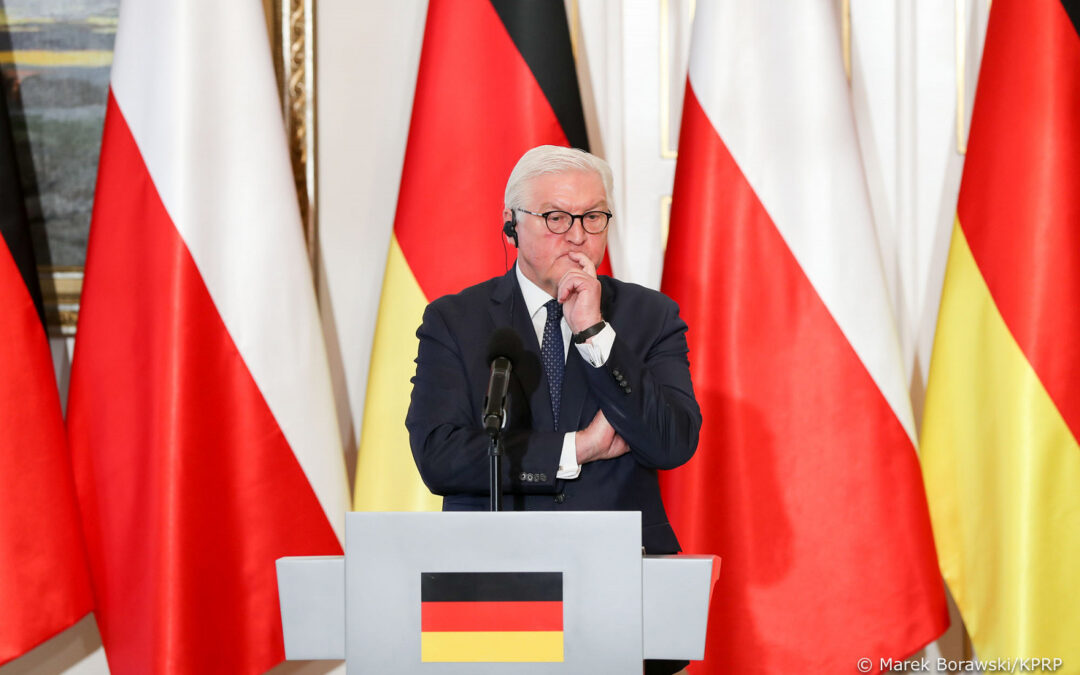There can be no return to normal relations with Russia after its invasion of Ukraine, said German President Frank-Walter Steinmeier on a visit to Warsaw. He also pledged that Germany would stand “shoulder to shoulder” with Poland, including supporting it in hosting Ukrainian refugees.
Steinmeier had previously been a long-time advocate of friendly relations with Russia, including during his time as Gerhard Schröder’s chief of staff and later as foreign minister under Angela Merkel. However, his Social Democratic Party (SPD) has recently had to confront the failure of its “change through rapprochement” policy.
The German president himself admitted last month that he had “clearly [made] a mistake” in his support for the Nord Stream 2 pipeline bringing Russia gas to Germany – a project that Poland strongly opposed and which Germany suspended shortly before the invasion of Ukraine.
Russia has "committed genocide" in Ukraine and must face severe international repercussions, says Poland's PM.
He criticised Macron for holding talks with Putin ("Would you negotiate with Hitler?") and Scholz for prioritising German business interests https://t.co/GGRX0hOypT
— Notes from Poland 🇵🇱 (@notesfrompoland) April 4, 2022
“In my opinion one thing is clear, there can be no return to normality in relations with Russia,” said Steinmeier during a joint press conference today with Polish counterpart Andrzej Duda, who has long warned of the threat posed by Russia and called for a tougher approach from Western leaders.
Steinmeier added that “Germany and Poland [now] stand shoulder to shoulder…in solidarity with Ukraine”. He also expressed gratitude to Poles for the “generous and well-organised aid” they have given to refugees.
“It is clear that Germany will continue to participate in solidarity in the hosting of and offering help to refugees,” he added. “We promise not to leave Poland and other neighbours of Ukraine alone.”
Duda, speaking alongside Steinmeier, said he hoped that Poland “can count on a positive voice from Germany” to persuade the EU to provide financial support to help member states that are hosting refugees from Ukraine.
Brussels has so far refused to create new financing mechanisms for this purpose, instead favouring the redistribution of existing money. But this week Poland’s prime minister called for a special fund to be created.
Last month, the German and Polish interior ministers issued a joint appeal to the European Commission for financial assistance, suggesting that member states be granted €1,000 per refugee.
In his remarks today, however, Duda reiterated Poland’s opposition to any “forced relocation” system for refugees, saying that they should “have the right to choose the place where they want to find shelter”.
Steinmeier had been due to visit Poland last month, in what would have been the first foreign trip of his second term as president, but was forced to cancel after testing positive for COVID-19.
Following his meeting with Duda today, Steinmeier was due to travel to Rzeszów in southeastern Poland for a summit with the presidents of the three Baltic states, Estonia, Latvia and Lithuania.
Earlier this month, Polish ruling party leader Jarosław Kaczyński told German newspaper Welt am Sonntag that he was “very dissatisfied with the attitude of the German government” towards the war in Ukraine. He called for it to provide more weapons to Kyiv and to support an embargo on Russian oil.
“The German government has for years refused to see what Russia was doing under Putin’s leadership,” said Kaczyński. “Now we can see that it ended badly. It wasn’t that hard to predict. But the Germans believed that they knew better.”
Main image credit: Marek Borawski/KPRP

Alicja Ptak is deputy editor-in-chief of Notes from Poland and a multimedia journalist. She has written for Clean Energy Wire and The Times, and she hosts her own podcast, The Warsaw Wire, on Poland’s economy and energy sector. She previously worked for Reuters.




















